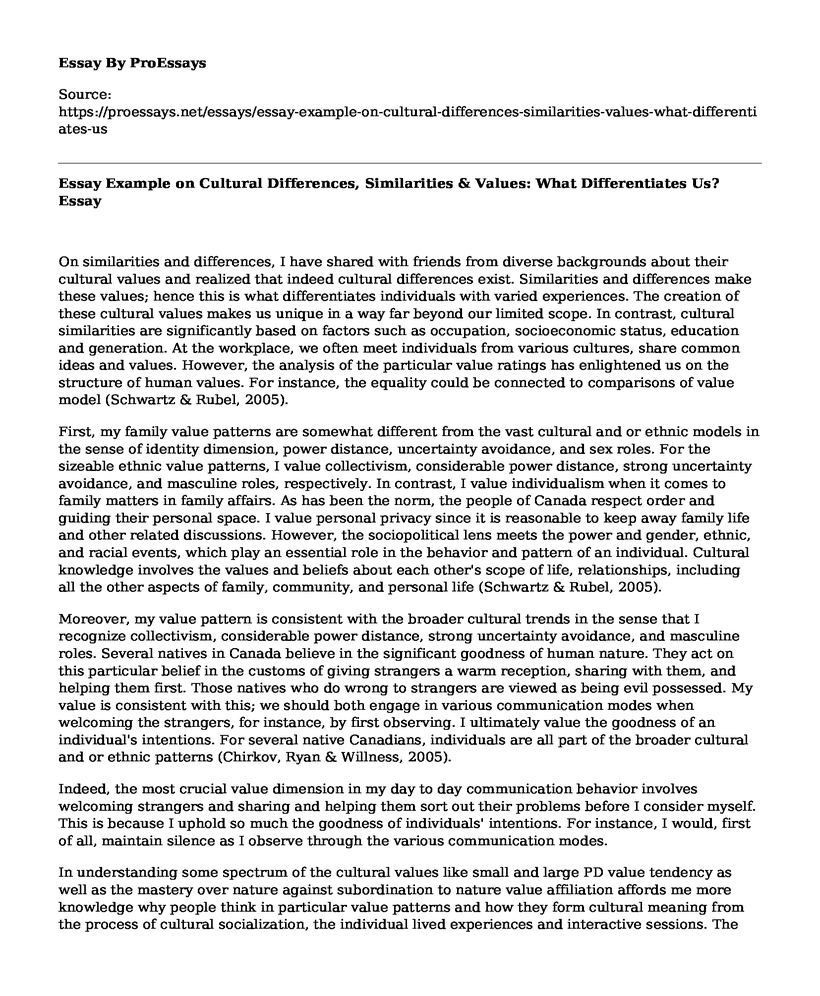On similarities and differences, I have shared with friends from diverse backgrounds about their cultural values and realized that indeed cultural differences exist. Similarities and differences make these values; hence this is what differentiates individuals with varied experiences. The creation of these cultural values makes us unique in a way far beyond our limited scope. In contrast, cultural similarities are significantly based on factors such as occupation, socioeconomic status, education and generation. At the workplace, we often meet individuals from various cultures, share common ideas and values. However, the analysis of the particular value ratings has enlightened us on the structure of human values. For instance, the equality could be connected to comparisons of value model (Schwartz & Rubel, 2005).
First, my family value patterns are somewhat different from the vast cultural and or ethnic models in the sense of identity dimension, power distance, uncertainty avoidance, and sex roles. For the sizeable ethnic value patterns, I value collectivism, considerable power distance, strong uncertainty avoidance, and masculine roles, respectively. In contrast, I value individualism when it comes to family matters in family affairs. As has been the norm, the people of Canada respect order and guiding their personal space. I value personal privacy since it is reasonable to keep away family life and other related discussions. However, the sociopolitical lens meets the power and gender, ethnic, and racial events, which play an essential role in the behavior and pattern of an individual. Cultural knowledge involves the values and beliefs about each other's scope of life, relationships, including all the other aspects of family, community, and personal life (Schwartz & Rubel, 2005).
Moreover, my value pattern is consistent with the broader cultural trends in the sense that I recognize collectivism, considerable power distance, strong uncertainty avoidance, and masculine roles. Several natives in Canada believe in the significant goodness of human nature. They act on this particular belief in the customs of giving strangers a warm reception, sharing with them, and helping them first. Those natives who do wrong to strangers are viewed as being evil possessed. My value is consistent with this; we should both engage in various communication modes when welcoming the strangers, for instance, by first observing. I ultimately value the goodness of an individual's intentions. For several native Canadians, individuals are all part of the broader cultural and or ethnic patterns (Chirkov, Ryan & Willness, 2005).
Indeed, the most crucial value dimension in my day to day communication behavior involves welcoming strangers and sharing and helping them sort out their problems before I consider myself. This is because I uphold so much the goodness of individuals' intentions. For instance, I would, first of all, maintain silence as I observe through the various communication modes.
In understanding some spectrum of the cultural values like small and large PD value tendency as well as the mastery over nature against subordination to nature value affiliation affords me more knowledge why people think in particular value patterns and how they form cultural meaning from the process of cultural socialization, the individual lived experiences and interactive sessions. The more I understand the origin of cultural strangers at the workplace in terms of their modes of thinking, behavioral predispositions, and affective reactions, the more I learn to accept and embrace their communicative frames and value orientation and learn to collaboratively, and adaptively work with them.
Cultural values play essential roles both at family and developmental levels such as the maintenance of identity, group solidarity as well as reinforcing different ethnocentric habitual doings and communication norms, intergroup and intercultural relatedness.
Some of the dimensional differences between my cultural values (Canadian) and the Latin Americans is that they value so much their religious and spiritual orientations, they are more concerned with their spiritual matters than their general well-being unlike in Canada where people are concerned with job promotions and large salaries to fend for themselves and their immediate family. In Latin, people recreate and celebrate together with friends and all the family members, which forms an essential part of their culture.
Conclusion
Conclusively, I would be conscious of intercultural communication, especially on the value communication levels, taking into account the following ideas and practice or application to control decisive value clashes including comprehending that there exist various value preferences for membership in diverse cultures and or co-cultures. I would also take into consideration multiple contexts, situations, and personality trends that might interfere with the sampling of collective and individualistic elements of Small and more abundant power distance elements in a specific culture, and lastly, establish a culture-relative procedure in understanding various cultural values. Relativism in culture would mean following a specific set of cultural values rather than the personal ethnocultural frame of references (Chirkov et al., 2005).
References
Chirkov, V. I., Ryan, R. M., & Willness, C. (2005). Cultural context and psychological needs in Canada and Brazil: Testing a self-determination approach to the internalization of cultural practices, identity, and well-being. Journal of Cross-Cultural Psychology, 36(4), 423-443.doi.org/10.1177/0022022105275960
Schwartz, S. H., & Rubel, T. (2005). Sex differences in value priorities: Cross-cultural and multimethod studies. Journal of personality and social psychology, 89(6), 1010.doi.org/10.1037/0022-3514.89.6.1010
Cite this page
Essay Example on Cultural Differences, Similarities & Values: What Differentiates Us?. (2023, Apr 24). Retrieved from https://proessays.net/essays/essay-example-on-cultural-differences-similarities-values-what-differentiates-us
If you are the original author of this essay and no longer wish to have it published on the ProEssays website, please click below to request its removal:
- The Impact of PTSD on Veterans' Family Relationships: An Interpretative Phenomenological Inquiry
- Essay Sample on Exploring Cultural Diversity: The Iceberg Model
- Essay Sample on Passing: Exploring Racism, Belonging & Vulnerability in Harlem Renaissance
- Essay on Michelle's Journey: From Missouri to Minnesota and Beyond
- America's Diversity: Uniting and Divisive Forces - Essay Sample
- Paper Sample on Cultural Diversity: Uniting Humanity Through Cuba's Example
- Native Americans vs. European Americans - Essay Sample







